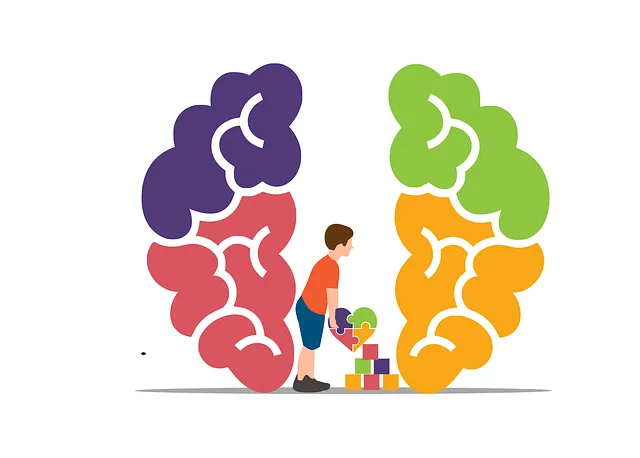Colorado Springs Kaiser Permanente psychiatry leads the way in Crisis Intervention Team (CIT) training with its comprehensive, research-driven program. Utilizing Mind Over Matter principles and emotional intelligence, CITs de-escalate high-stress situations from suicidal ideation to anxiety attacks. Their innovative training combines theoretical knowledge with hands-on experience via role-playing, group discussions, case studies, and multimedia presentations. Continuous improvement strategies, including regular assessments and feedback loops, ensure the program's adaptability and effectiveness in fostering supportive environments where seeking mental health help is normalized.
“Crisis intervention teams (CITs) play a pivotal role in mental health care, offering swift and effective support during crises. This article explores the critical components of CIT training programs, using Colorado Springs Kaiser Permanente Psychiatry as a standout example. We’ll delve into essential training methods, highlighting engaging techniques that optimize learning. Additionally, we’ll discuss implementation strategies and continuous improvement approaches to enhance crisis response outcomes, drawing insights from innovative practices at Kaiser Permanente.”
- Understanding Crisis Intervention Teams: A Key Component in Mental Health Care
- Colorado Springs Kaiser Permanente Psychiatry: A Leading Example for Training Programs
- Essential Components of Effective Crisis Intervention Team Training
- Training Methods and Techniques: Engaging Participants for Optimal Learning
- Implementation and Continuous Improvement: Ensuring Long-Term Success in Crisis Response
Understanding Crisis Intervention Teams: A Key Component in Mental Health Care

In today’s fast-paced world, effective crisis intervention is more crucial than ever, especially in mental health care settings like Colorado Springs Kaiser Permanente psychiatry. Crisis Intervention Teams (CITs) serve as a vital resource, providing immediate support and strategies to help individuals navigate traumatic or intense situations. These specialized teams are designed to offer a proactive approach, ensuring that those experiencing crises receive the necessary assistance promptly.
The core strength of CITs lies in their ability to foster emotional intelligence, utilizing Mind Over Matter principles to de-escalate high-stress scenarios. By promoting understanding and empathy, these teams can effectively manage a range of issues, from suicidal ideation to severe anxiety attacks. Through comprehensive training programs, members gain the skills to recognize subtle cues, respond sensitively, and provide tailored interventions. Moreover, public awareness campaigns development around CITs encourages communities to embrace mental health support, fostering an environment where seeking help is normalized and encouraged.
Colorado Springs Kaiser Permanente Psychiatry: A Leading Example for Training Programs

Colorado Springs Kaiser Permanente Psychiatry has emerged as a leading example for crisis intervention team training programs. Their comprehensive approach integrates Mental Health Policy Analysis and Advocacy, ensuring that their teams are equipped with the latest research-backed strategies. By focusing on Coping Skills Development, they empower individuals to navigate stressful situations effectively. Furthermore, Colorado Springs Kaiser Permanente Psychiatry prioritizes Mental Illness Stigma Reduction Efforts, fostering inclusive environments where help-seeking is encouraged.
Through innovative training methodologies, they prepare crisis intervention teams to handle a wide range of mental health crises. This commitment to excellence not only benefits patients but also contributes to the broader community’s resilience and well-being. Their success serves as a model for healthcare organizations worldwide, demonstrating that robust crisis intervention team training can transform lives and create more supportive communities.
Essential Components of Effective Crisis Intervention Team Training

Effective crisis intervention team training should encompass several key components to ensure that teams are well-prepared and equipped to handle critical situations. At Colorado Springs Kaiser Permanente psychiatry, for instance, programs focus on fostering strong communication skills among team members. This includes active listening, clear articulation of thoughts and feelings, and the use of open-ended questions to encourage dialogue. By promoting these strategies, training helps build a foundation of empathy, enabling team members to connect with individuals in crisis more profoundly.
Moreover, successful training programs emphasize the importance of self-esteem improvement and burnout prevention. They teach participants how to recognize their own emotional states during high-stress situations and equip them with coping mechanisms to maintain resilience. Incorporating empathy building strategies alongside these techniques ensures that crisis intervention teams not only address immediate needs but also nurture a supportive environment, ultimately enhancing the overall effectiveness of their interventions.
Training Methods and Techniques: Engaging Participants for Optimal Learning

Effective crisis intervention team (CIT) training programs employ diverse methods and techniques to ensure optimal learning for participants. One key aspect is incorporating interactive and engaging activities that simulate real-world scenarios, allowing trainees to practice their skills in a safe environment. This could include role-playing exercises where individuals step into different roles within a CIT, such as the crisis worker, family member, or community member, fostering empathy and understanding of varied perspectives.
At Colorado Springs Kaiser Permanente psychiatry, training is tailored to build resilience among team members, offering strategies for trauma support services and burnout prevention. By combining theoretical knowledge with hands-on experience, these programs empower participants to effectively manage and de-escalate crises. Engaging methods like group discussions, case studies, and multimedia presentations cater to diverse learning styles, ensuring every team member walks away with valuable insights and practical tools to handle crisis situations competently.
Implementation and Continuous Improvement: Ensuring Long-Term Success in Crisis Response

The success of crisis intervention team training programs lies not only in their initial implementation but also in continuous improvement strategies. At Colorado Springs Kaiser Permanente psychiatry, for instance, regular assessments and feedback loops are crucial to ensure that the program remains effective and relevant. By fostering an environment where learning and adaptation are prioritized, the team can better navigate evolving challenges in crisis response. This includes incorporating innovative techniques such as advanced stress management training and exploring new emotional healing processes, all while refining existing protocols through practical application and expert guidance.
Such ongoing efforts not only enhance the team’s preparedness but also promote a culture of resilience within the organization. By adopting effective stress reduction methods and integrating them into their practice, crisis intervention teams can provide more comprehensive care to individuals in distress. This holistic approach ensures that the program remains dynamic, capable of addressing emerging trends and needs, and ultimately contributes to improved outcomes for patients facing mental health crises.
Crisis intervention team (CIT) training programs, exemplified by Colorado Springs Kaiser Permanente’s innovative practices, are pivotal in enhancing mental health care. By integrating effective components such as comprehensive curriculum, interactive methods, and continuous improvement, these programs empower healthcare professionals to navigate crises with skill and empathy. Adopting successful models like those seen in leading institutions ensures better patient outcomes and a more resilient response system, ultimately fostering a healthier and safer environment for all.






